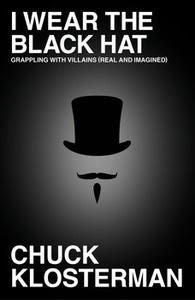Take a photo of a barcode or cover
Something about Klosterman's writing is remarkably captivating to me. This is the fourth book of his I've read and the fourth book of his that has both made me think deeply and also not want to stop reading. A couple of the essays in this book were maybe a little too broad or pulling too obscure of references together, but most are brilliant. His take on Seinfeld, for instance, is amazing and will surely be in my head for a long time.
3.5 ⭐️ rounded down
This set of essays was interesting, but felt a bit repetitive.
This set of essays was interesting, but felt a bit repetitive.
More than anything what amazed me about this book was how much work it must take Klosterman to seem so conversational in his essays. Twice while reading this book was I struck by the realization that he must have read an entire book just to include it in a particular essay (specifically the Bill Clinton and OJ Simpson essays.) I love Klosterman's approach and writing style but for the first time the effort it must take to achieve those results was incredibly evident to me for the first time.
An OK read, has some amazing insights, especially at how we choose whom we demonize, but it is full of obscure references and disjointed a lot of the time. While it is possible that the former criticism is because I am of a younger generation, I haven't found a excuse for the latter. Would I recommend it? That depends on the person I'm recommending it to.
“A villain is someone who knows the most but cares the least.”
Give that a good long think.
Gotta admit it: I have a soft spot in my heart for the villains. Guess for those of you who know me, that isn’t admitting much.
This book was a compelling look at the bad guys in pop culture like Chevy Chase, Bill Clinton, Andrew Dice Clay and the Eagles. So the villains Klosterman is analyzing are, for the most part, real people rather than our favorite villains from fiction.
What I would have liked was more. It all seemed to pass too quickly.
I listened to this book, read by the author.
Give that a good long think.
Gotta admit it: I have a soft spot in my heart for the villains. Guess for those of you who know me, that isn’t admitting much.
This book was a compelling look at the bad guys in pop culture like Chevy Chase, Bill Clinton, Andrew Dice Clay and the Eagles. So the villains Klosterman is analyzing are, for the most part, real people rather than our favorite villains from fiction.
What I would have liked was more. It all seemed to pass too quickly.
I listened to this book, read by the author.
CK thinks about things in astonishing ways. He draws lines between seemingly unrelated data. I do wish there had been a little less sport talk.
I enjoyed this book, but had to give it three stars because I ended the book less excited about it than I was when I started. The three stars are as much my fault as Chuck's. I was hoping this would be a discussion of the character structure of villains in general rather than an examination of what makes one person a villain over another in popular culture. There's nothing wrong with his examination--it's thoughtful and often funny--it just didn't quite offer me what I was hoping for when I started. It's also still a valuable explanation that helped me realize why a character could be considered a villain in a story; it just didn't speak to that specifically. I'm also not much of a football person, so many of his football-based stories were only tangentially interesting.
But his honesty and his examination of those American culture tends to consider "villainous" is still definitely worth a read. This book is probably much more widely appealing than the book I thought this was would be, to be honest. Only WRITERS would read about CHARACTERS, right?
But his honesty and his examination of those American culture tends to consider "villainous" is still definitely worth a read. This book is probably much more widely appealing than the book I thought this was would be, to be honest. Only WRITERS would read about CHARACTERS, right?
While I enjoyed Klosterman's prose, I would say I went into the book expecting it to delve more into our culture's interest in fictional villains. Instead Klosterman delivers a treatise on the real "villains" in celebrity culture or in the political arena. Though it wasn't what I was expecting the content was engrossing and entertaining, so I was in no way disappointed.
I pretty much always enjoy this author's voice and critical thinking abilities. That said this is not my favorite of his books. This did not take away from my enjoyment at all. I just feel that some of the thoughts were laid out a little haphazardly and some points went on just a little too long. I do however, now know the difference between a "villian" and just straight up "evil." And it was so much fun listening to all aspects of that distinction in our modern day life.




